|
|
|
Sort Order |
|
|
|
Items / Page
|
|
|
|
|
|
|
| Srl | Item |
| 1 |
ID:
117898
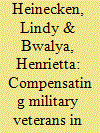

|
|
|
|
|
| Publication |
2013.
|
| Summary/Abstract |
This article outlines the widespread needs of South African military veterans and the possible consequences if the promises made in the recent Military Veterans Act are not met. The first part of the article defines who generally qualifies as a military veteran, how they are typically compensated in various countries with specific reference to neighbouring southern African countries, and what the consequences are when veterans become disenchanted with the state. The second part focuses on South Africa and the recent debates on military veterans and their entitlements. With reference to the findings of a qualitative study conducted among military veterans, parliamentary debates and media reports, an assessment is made of the demands and affordability of promised benefits and the consequences should the state not deliver. The conclusion is reached that heightened expectations are presently frustrated by slow roll-outs, and this is likely to increase the possibility of protest action. This has now the potential to create further tension within the ruling party and civil society, as the pressure on public finances mounts and demands become unsustainable. The effect this may have on political stability will depend on how the government manages this issue.
|
|
|
|
|
|
|
|
|
|
|
|
|
|
|
|
| 2 |
ID:
152317
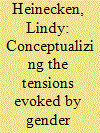

|
|
|
|
|
| Summary/Abstract |
The South African military has adopted an assertive affirmative action campaign to ensure that women are represented across all ranks and branches. This has brought about new tensions in terms of gender integration, related to issues of equal opportunities and meritocracy as well as the accommodation of gender difference and alternative values. The argument is made that the management of gender integration from a gender-neutral perspective cannot bring about gender equality, as it obliges women to conform to and assimilate masculine traits. This affects women’s ability to function as equals, especially where feminine traits are not valued, where militarized masculinities are privileged and where women are othered in ways that contribute to their subordination. Under such conditions, it is exceedingly difficult for women to bring about a more androgynous military culture espoused by gender mainstreaming initiatives and necessary for the type of missions military personnel are engaged in today.
|
|
|
|
|
|
|
|
|
|
|
|
|
|
|
|
| 3 |
ID:
086658
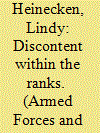

|
|
|
|
|
| Publication |
2009.
|
| Summary/Abstract |
Numerous studies have examined how armed forces have adapted their organizational and force structures to become more cost-effective, flexible, and deployable. However, comparatively few studies have looked at how these systemic influences affect attitudes toward military employment. With reference to findings of a survey conducted among middle-ranking officers in the United Kingdom, Canada, South Africa, and Germany, the attitudes of officers toward their current employment is examined within a comparative context, by referring to the impact of organizational restructuring on their careers and on commitment to military service; issues relating to pay, service, and work conditions; trust in military leadership's ability to defend their interests; and the perceived need for some form of independent representation. The study concludes that the present discontent within the ranks is creating a kind of professional or institutional disunity, which may necessitate a revision of how employee relations are managed within armed forces.
|
|
|
|
|
|
|
|
|
|
|
|
|
|
|
|
| 4 |
ID:
131091
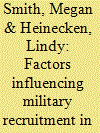

|
|
|
|
|
| Publication |
2014.
|
| Summary/Abstract |
This research sets out to establish how the youth in South Africa view military service, and what factors affect the ability of the South African National Defence Force (SANDF) to attract suitable recruits to staff its modern, technologically advanced military. Due to high levels of youth unemployment, South Africa has sufficient persons volunteering for military service. The problem lies with recruiting sufficient quality personnel with the right profile and abilities. To establish what affects enlistment, focus group discussions were conducted with learners from eight schools to determine what influences their career choices, what deters them from or attracts them to military service, their perception of the military profession, their knowledge of the military, and the influence of factors such as race and gender. The conclusion is reached that the SANDF is not considered an employer of choice due to poor service conditions, a decline in the prestige of the military, unfavourable aspects associated with military culture, a growing 'knowledge gap' and disconnect between the military and South African society, the estrangement of certain race groups, and the masculine nature of the military. These aspects need to be addressed if the SANDF wishes to attract learners with good academic credentials.
|
|
|
|
|
|
|
|
|
|
|
|
|
|
|
|
| 5 |
ID:
113321


|
|
|
|
|
| Publication |
2012.
|
| Summary/Abstract |
In Africa, most of the present conflicts are civil, intra-state wars where belligerent groups use guerrilla tactics to achieve various political, economic or ideological objectives. The atrocities and the effect of these on-going wars on innocent civilians, human suffering, poverty and development are beyond comprehension. Not surprisingly, the majority of current peace operations are in Africa, with more than 70 countries contributing forces to these conflict zones. On the continent, South Africa has come to assume a leading role in peace operations and is now a major troop-contributing country to UN and AU missions. In the past 11 years, the South African National Defence Force (SANDF) has taken part in no fewer than 14 peace missions. This article provides a brief background of the conflicts in Burundi, the Democratic Republic of Congo (DRC) and Sudan, the different United Nations (UN) and African Union (AU) mandates under which peacekeepers had to operate as well as their objectives, and the extent of South Africa's involvement in the various missions. In the last section, the major challenges, that these operations have posed are highlighted.
|
|
|
|
|
|
|
|
|
|
|
|
|
|
|
|
| 6 |
ID:
113322


|
|
|
|
|
| Publication |
2012.
|
| Summary/Abstract |
This article reports on the experiences of South African military personnel who have been deployed on peace missions in Burundi, the DRC and Darfur/Sudan. These missions are extremely challenging for peacekeepers given the complex, vicious and protracted nature of the conflicts in these countries. This has placed heavy demands on individuals participating in field operations, not only because the operations are often dangerous and unpredictable, but also because of the conditions under which they have to serve and the resources available to them. In this study, the experiences of 94 SANDF personnel who have been deployed primarily in Burundi, the DRC and Sudan are analysed in relation to their operational experiences; the challenges posed by the rules of engagement; shortcomings in their training; and their readiness and interaction with other role players. The findings of this empirical research provide a real sense of how peacekeepers at the tactical level experience these deployments from a uniquely South African perspective.
|
|
|
|
|
|
|
|
|
|
|
|
|
|
|
|
| 7 |
ID:
113323


|
|
|
|
|
| Publication |
2012.
|
| Summary/Abstract |
This article focuses on the psychological dimensions of deployment in peace operations. The first section examines whether South African military personnel find their deployments in these missions satisfying. The concomitant aim is to determine what motivated military personnel to serve in these missions where they were required to help, protect and save mostly civilians in countries to which they owe little allegiance. The focus then shifts to how peacekeepers cope with the stress associated with these missions, not only in terms of operations but also lengthy separations from family, friends and loved ones. The final section addresses issues of adaptation and reintegration upon their return. The findings of this part of the study indicate that peacekeepers serve in peace operations for a number of reasons. Most find the missions satisfying, but there are many stressors that affect their wellbeing and willingness to redeploy.
|
|
|
|
|
|
|
|
|
|
|
|
|
|
|
|
| 8 |
ID:
178345
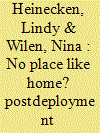

|
|
|
|
|
| Summary/Abstract |
This study focuses on soldiers returning from peacekeeping missions and the challenges they experience adapting to the home environment in the postdeployment phase. The article focuses on South African peacekeepers returning from missions in Darfur/Sudan, the Democratic Republic of Congo, and Burundi. Interviews with 50 South African peacekeepers on the challenges they face in terms of their homecoming, family reintegration, and military support were conducted. Overall, the study found that both external military factors such as deployment length and nature of mission, and internal factors specific to the soldier affected reintegration. We highlight three major findings of our study: Firstly, our analysis show that peacekeepers across gender, rank, and race identify the absence from their children as a major challenge. Secondly, while relational turbulence characterized by ambivalence and concerns about infidelity was prevalent among all, there was a clear difference in the answers between the male and female peacekeepers. Thirdly, a large majority voiced the need for more support from the military institution for their families, before, during, and after deployment.
|
|
|
|
|
|
|
|
|
|
|
|
|
|
|
|
| 9 |
ID:
135994


|
|
|
|
|
| Summary/Abstract |
Since the end of the Cold War, there has been an exponential growth in the use of private military and security companies. Few have debated the long-term consequences outsourcing of security holds for the military profession. The first section of this article outlines the evolution of military outsourcing. From here the focus shifts to how outsourcing affects the armed forces’ ability to retain the monopoly over their “own” knowledge and skills base, and how it affects their autonomy, corporateness, and service ethic. The implications that this has for the armed forces and the military profession are deliberated. The conclusion is reached that extensive growth and use of private security have affected the intellectual and moral hegemony of the armed forces as providers of public security. The long-term implications of this in terms of the social structure and the identity of the military profession are not yet fully realized.
|
|
|
|
|
|
|
|
|
|
|
|
|
|
|
|
| 10 |
ID:
151531
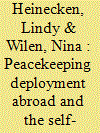

|
|
|
|
|
| Summary/Abstract |
During the last three decades, international peace operations have multiplied. As a consequence, trainings and deployments for peace missions have become an essential part of the military’s work. Yet the importance of peace operations to the individual soldier’s career development has so far been relatively absent in academic writing. This article attempts to fill this gap by examining how soldiers perceive the effects of their peace operation deployments in terms of career opportunities and status upon reintegration in the home unit. Adopting an inductive approach, the authors analyse 50 interviews conducted with military personnel from the South African Defence Force (SANDF). The findings show mixed responses in terms of the effect of deployments on career development. In general senior staff value the experience acquired more highly than lower ranks who experience multiple deployments as having a negative effect on vertical career mobility. Nor do lower ranked personnel see any marked change in the (in) formal status upon reintegration back into their national armed force, while higher staff officers perceive an enhanced status especially where this is related to operational success. The article argues that peacekeeping deployment should be seen as a process, which has consequences for the individual soldiers’ career long after homecoming, rather than as an independent event during a lifelong career.
|
|
|
|
|
|
|
|
|
|
|
|
|
|
|
|
| 11 |
ID:
097675
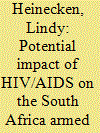

|
|
|
|
|
| Publication |
2009.
|
| Summary/Abstract |
HIV/AIDS has wide ramifications for the armed forces, especially in those regions where
the epidemic is most prevalent. Understanding how this disease affects armed forces and
more specifically the SANDF as regional military power is not only of national but also
of regional and international concern. In this article an attempt is made to uncover how
HIV/AIDS affects force procurement, namely the ability to recruit suitable candidates
for military service in South Africa. The discussion then moves to within the SANDF
and an effort is made to indentify possible problem areas in terms of personnel shortages
by looking at current rates of attrition in certain age and occupational categories. In
light of this, the impact on force employment and deployment is assessed. In the final
section the influence HIV/AIDS has on force sustainment is discussed, as well as the
health, financial and diplomatic and human rights implications this disease poses for
armed forces.
|
|
|
|
|
|
|
|
|
|
|
|
|
|
|
|
|
|
|
|
|